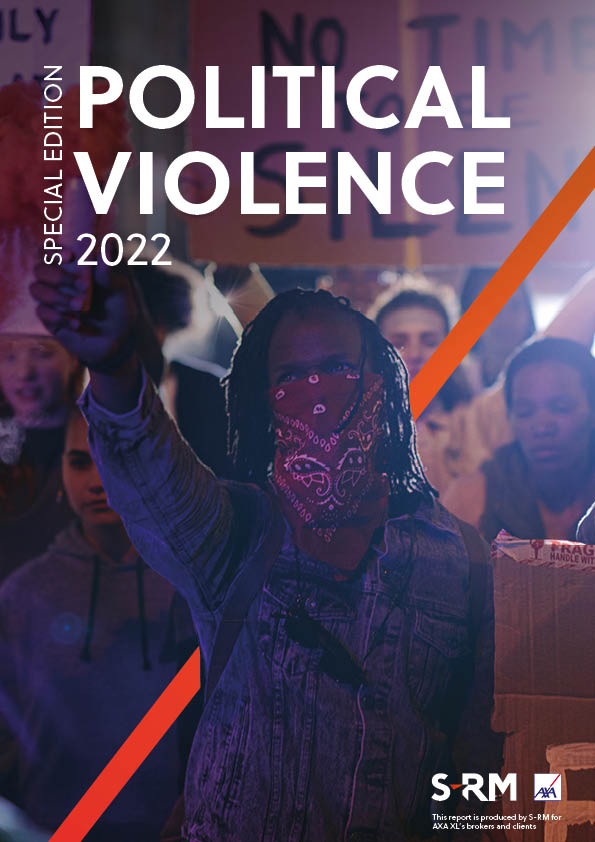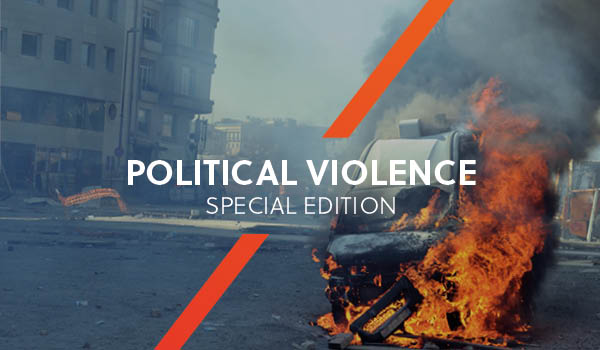The Covid-19 pandemic and its knock-on effects have driven protests worldwide since 2020. Erin Drake writes that protests over climate change, anti-vaccine mandates and anti-austerity measures will remain disruptive, and in some cases gain ground through 2022.
In 2021, many countries began the road to uneven recovery as vaccination campaigns escalated and travel bans began to lift. Eased restrictions on movement also brought increased opportunities for civic activism; issues like climate change, vaccine hesitancy and inflation have driven major protest movements in 2021, exacerbated by states’ strained resources. As governments struggle to raise vaccination levels, address new outbreaks and offset the economic fallout of Covid-19, they will also need to contend with the pandemic’s economic and social impacts, and a growing expectation that they engage with universal concerns like environmental protection and minority rights. But in many cases, issues like strained fiscal capacity and corruption will limit authorities’ abilities to execute such a juggling act and prevent unrest.
ENVIRONMENTAL AND SOCIAL GOVERNANCE
Governments, companies and activists continued to home in on environmental, social and governance (ESG) issues in 2021, and this focus will intensify in 2022. In the lead-up to the October COP26 summit held in Glasgow, environmental protests became increasingly well attended and, in some cases, disruptive. At least 1,400 climate change protests occurred globally in 2021, with most held in Europe. Hundreds of thousands marched in cities worldwide during the ‘16 Days Campaign’ to denounce gender-based violence and the pandemic-related social and health crisis faced by those in vulnerable LGBTQ+ communities. Over 1,100 protests relating to minority rights took place globally in 2021. Companies have also faced a backlash as their ESG policies and behaviour are scrutinised by investors and the public.
Consumers’ expectations of ethically sourced products and services will grow, while investors will become more critical of where they put their money, avoiding companies with questionable ESG practices. Many governments will also increasingly be held accountable for inaction on issues like gender equality and carbon emissions. This will drive more targeted protests against companies, governments and high-profile individuals unaligned with these goals.
ANTI-VACCINE SENTIMENT AND A REJECTION OF VACCINE MANDATES
Public sentiment against Covid-19 vaccines and mandated vaccinations continues to drive protests in many countries. There were over 2,000 anti-vaccine protests globally in 2021. While vaccine mandates have proven successful in increasing vaccination levels, and have been welcomed by many, they have been scorned by others, including by some healthcare workers, police and other public service providers. The US has so far accounted for the highest number of anti-vaccine protests, with 940 occurring in 2021; at least 370 have been held in Europe. As vaccines become widely available and sporadic variant outbreaks arise, more governments and sub-national authorities will likely opt for implementing or maintaining vaccine mandates. We can also expect public services, private companies and public venues like restaurants and gyms to bandwagon and implement proof-of-vaccine policies for entry, or incentives for vaccinated workers.
Resentment and protests over mandates will persist in the coming year, even if much of this anger has, in some countries like France, given way to reluctant acceptance. Vaccine resistance will continue to impact commercial activities as recurring outbreaks affect labour availability and exacerbate existing supply chain crises. Some protests have turned violent, and there have even been attacks on healthcare workers and facilities. In October 2021, unionised Moroccan workers attacked guards and attempted to force their way into the Directorate of Health in Rabat, while a mob in Alta Verapaz, Guatemala, held 17 nurses hostage and destroyed coronavirus vaccines. Widespread riots took place in Italy as far-right anti-vaccine protesters stormed parliament. In December, demonstrators in Ecatepec de Morelos, Mexico, damaged several vehicles and physically attacked motorists during a highway blockade, while protesters in the Netherlands fought police over renewed restrictions banning unvaccinated people from certain venues. Such frustrations will fuel similar unrest in 2022.
Case studiesVACCINE RESISTANCE IN THE USDespite the caveats and vagueness associated with the concept of ‘herd immunity,’ efforts continue to ensure that vaccination levels improve globally. But governments still face scepticism. Misinformation and disinformation about vaccine safety and efficacy play a major role in such perceptions. Refusal to vaccinate is particularly high in the US; at least 30 percent of US healthcare workers remain unvaccinated, while multinational mining companies have seen the lowest vaccination rates among their US sites and workers. A New York Times study shows that the same demographic – far-right groups, conservatives and supporters of former president Donald Trump – who spread false news and conspiracy theories about election fraud in 2020 and 2021 have now switched their efforts to anti-vaccine campaigns. |
SOCIO-ECONOMIC DISCONTENT
Various existing grievances, like poverty, unemployment and inflation, have been exacerbated by the pandemic. Many countries have sought emergency financing following the pressures of an economic downturn coupled with the cost of government sponsored relief programmes. As the world eases into normalcy, governments have pitched strategies for economic recovery, facilitating a stop to many pandemic-related social assistance schemes. This has sparked global protests; in Tunisia, the population and powerful unions have rejected proposed subsidy cuts and other economic reforms the government will need to implement to reach an IMF deal for a USD 4 billion loan. In South Africa, fears have surged over the potential for more violent student riots over increased tuition fees – as seen during mass protests in 2015 and 2016 – while universities offset pandemic-related losses. Ecuador, Brazil, Mexico and Argentina have also faced protests amid efforts to cut fuel subsidies. As state-funded support schemes decrease, thousands of workers will risk losing jobs and income support, especially in the global tourism and hospitality sector which remains slow to recover and vulnerable to additional outbreaks and associated lockdowns. This will particularly affect low-income economies which have lagged behind in vaccinations.
Efforts to navigate economic recovery plans will drive discontent and unrest in the coming year. Grievances will be compounded in countries where the government is perceived as highly corrupt; in Kenya, 92 percent of pandemic-related funds went to big corporations rather than social protection, and corruption surrounding emergency loans sparked mass, often violent protests in 2021. Kenyans have petitioned the International Monetary Fund to cancel a USD 2.34 billion loan due to the country’s excessive debt and the government’s alleged mismanagement of funds.
case studiesEUROPE SCALES BACK COVID-19 ASSISTANCEEuropean governments have already begun to reduce emergency aid. The British government has halted grants for special unemployment benefits and businesses reopening post-lockdown, while Germany is no longer excusing firms from declaring bankruptcy if they are unable to pay bills. Job retention schemes worth over EUR 540 billion have mostly ended in Spain, the Netherlands, Sweden and Ireland. However, the spread of new variants like Delta and Omicron have raised concerns that this potentially pre-emptive reduction in assistance will leave many families and businesses unsupported in the event of further outbreaks. In France, for example, President Emmanuel Macron has threatened to introduce further vaccine mandates to force increased vaccinations following an escalation in cases in late-2021. This has coincided with a winding down of Covid-19 state funding, including wage subsidies and layoff prevention. |






 Email Erin
Email Erin





 @SRMInform
@SRMInform
 S-RM
S-RM
 hello@s-rminform.com
hello@s-rminform.com

